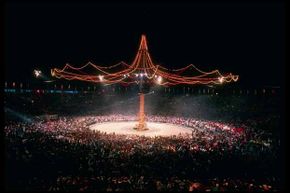TheOlympic Gamesnot only bring together elite athletes to compete on a global stage; they also give host nations a way to showcase their countries to the world. Successfully using the Olympics as advertisement can result in a tourism boom with financial rewards long after the closing ceremonies. The trick is to throw the world's biggest party without going bankrupt in the process.
Hosting the Olympics is afinancially risky proposition, one that begins a decade before the events are actually held. Cities compete to convince -- first their own countries, then the International Olympic Committee -- that they are the right venue: Safe, with convenient transportation, plus efficient and elaborate infrastructure. The process isn't cheap. Chicago, for example, spent an estimated $100 million in its bid to host the 2016 summer games -- and lost [source:Zimbalist]。
Advertisement
If a host city is selected, it partners with state and federal government -- and private enterprise -- to expand rail service, build massivehotelsand construct arenas in which to host the games. But even the best-laid plans seem to end with skyrocketing costs. An Oxford University study examining the Olympic Games from 1962 to 2012 discovered host cities experience, on average, a 179 percent cost overrun during the preparation phase [source:Black]。Perhaps underestimating expenditures is an Olympic tradition, too. It certainly seems that way when you look at our chronological list of Olympics that broke the bank, starting with the very first one.













